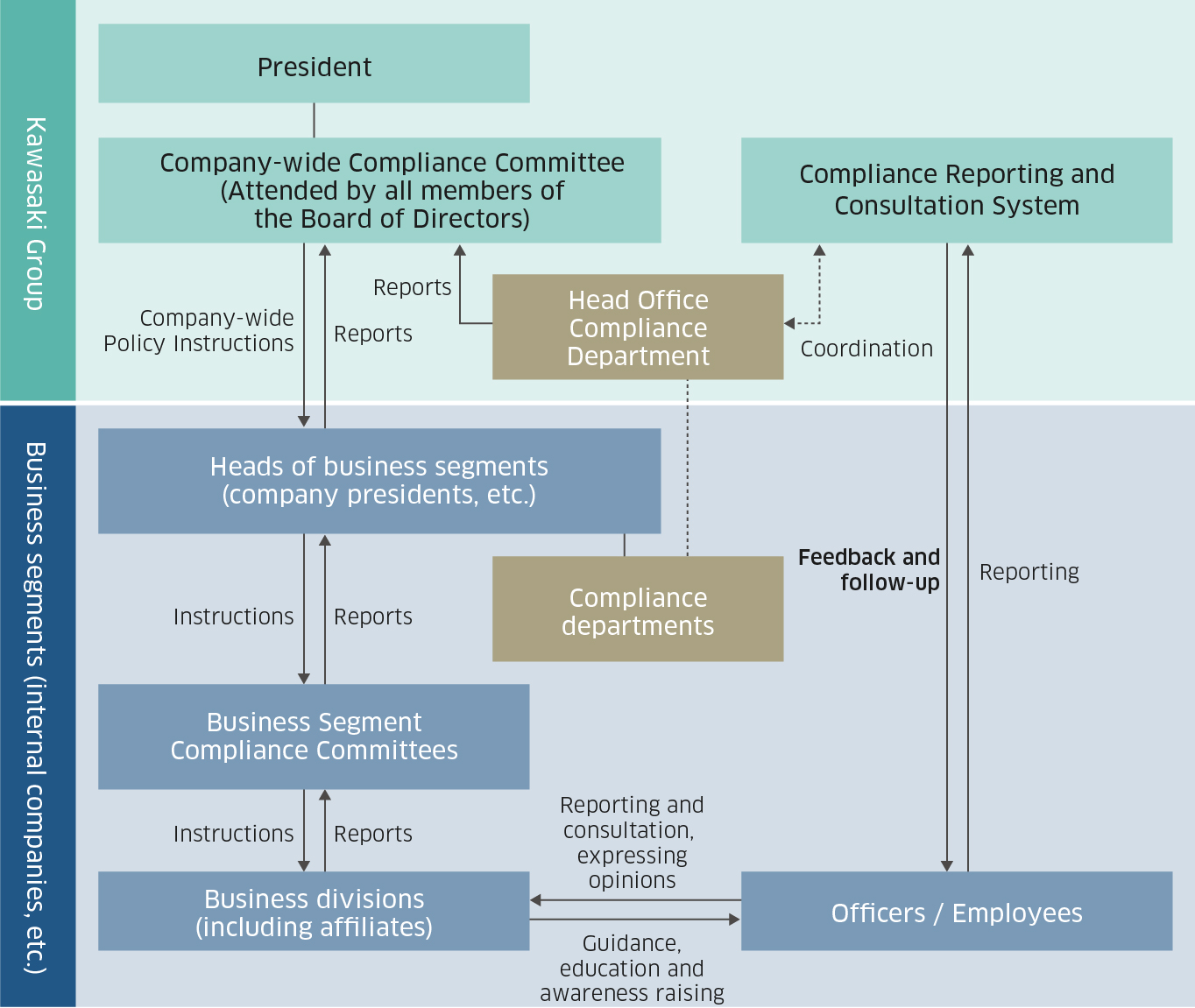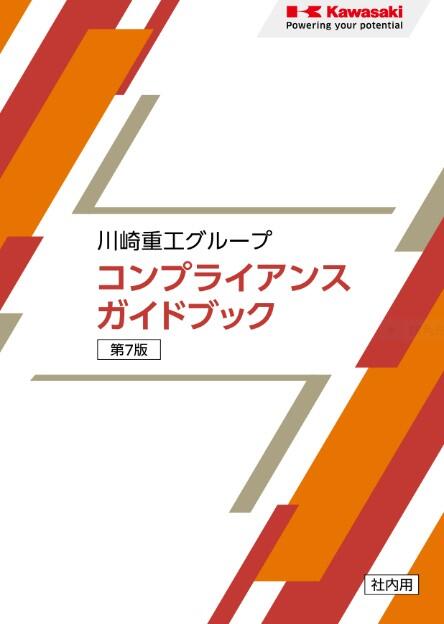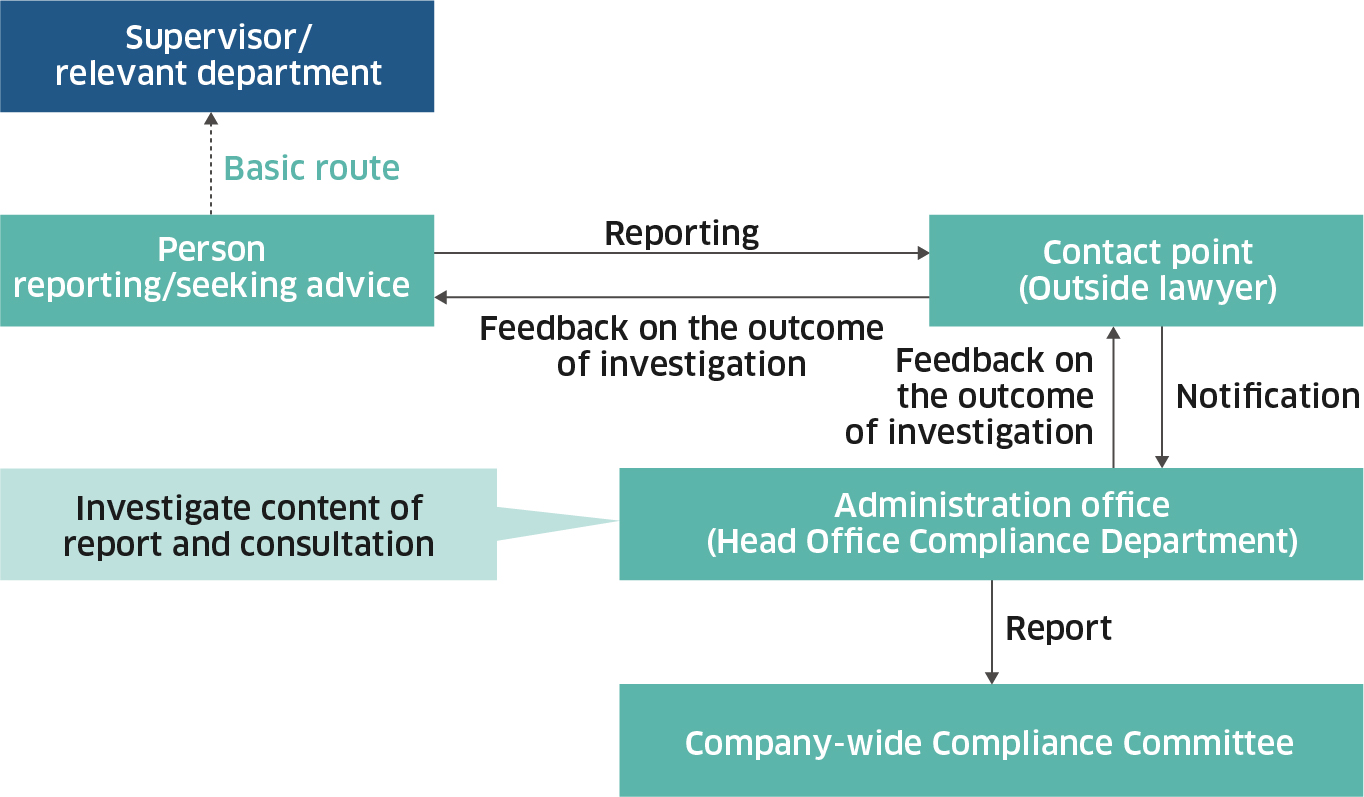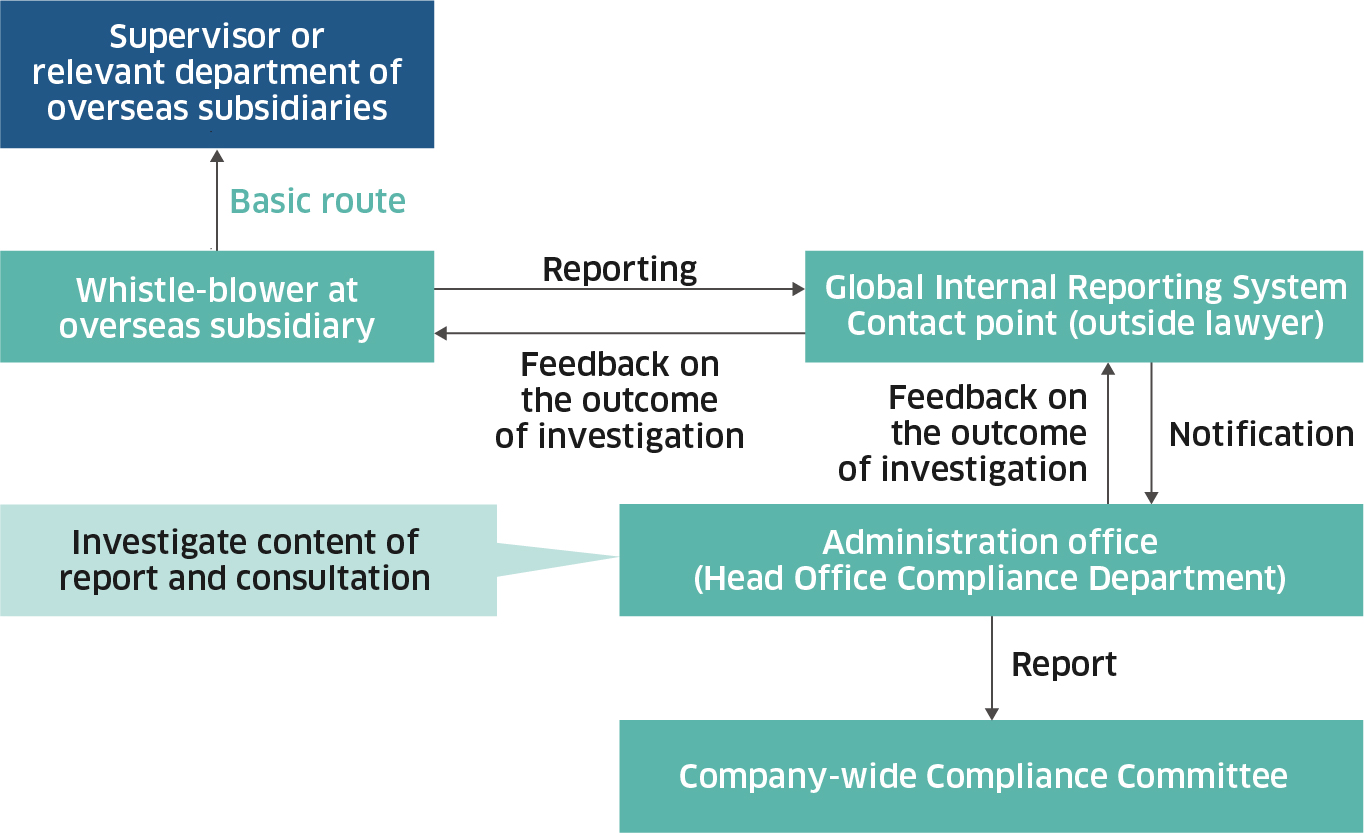Compliance and Anti-corruption Measures
- Management Approach
- Concrete Initiatives
- Whistle-Blowing System and Consultation Points
- Other Compliance Risks
Management Approach
Our Basic Stance
Strict compliance should be at the foundation of all Kawasaki Group business activities, and all Group officers and employees must engage in business with a proper awareness of compliance. The Group engages in diverse business, and we are required to comply with various laws and regulations in each business area and to act properly at all times according to the circumstances. In order to make proper decisions in a timely manner, it is optimal that each employee is able to take it for granted that he or she will unconsciously engage in proper conduct within his or her area of responsibility, that is, that compliance on a deeper level is achieved.
The Kawasaki Group's business entails numerous opportunities for contact with government agencies and public officials, and we are aware that there is a high likelihood of exposure to corruption risk. We consider it to be our responsibility to ensure strict compliance and prevent corruption by taking action to prevent all forms of corruption including bribery of domestic and foreign public officials, bribery of business partners, embezzlement, and money laundering.
Through various initiatives to strengthen compliance and thoroughly prevent corruption, each employee is made aware of the fundamentals of compliance, which is not merely following laws, regulations, and rules, but also always acting correctly to gain the trust of society in order to make the Kawasaki Group a sustainable group that is trusted by society even more and where every employee can work with pride.
Compliance and Anti-corruption Policy
In July 2017, we established the Kawasaki Group Code of Conduct as a set of ethical standards to guide the decision making of our Group officers and employees, and we also issued an explanatory pamphlet concerning the code at that time. The code was amended in January 2019, and a second version of the explanatory pamphlet was produced in April 2019. The code was established following consultations with the Management Committee and approval by the Board of Directors, and the same procedure is followed when making revisions as needed.
Furthermore, regarding anti-bribery measures, the Kawasaki Group Code of Conduct clearly states that the Kawasaki Group does not provide any inappropriate entertainment or gifts or otherwise tolerate bribery and outlines how individuals are expected to act. In addition, to promote stakeholder understanding of our commitment to anti-bribery initiatives, with approval from the Board of Directors, the Group established the Kawasaki Group Policy on Anti-Bribery, which summarizes the Group’s anti-bribery frameworks and initiatives.
Scope of Policy Application
Our Group officers and employees
Company Rules on Compliance and Anti-corruption
Kawasaki has established and enforces the rules relating to compliance and anti-corruption indicated below.
- Rules on Basic Policies concerning Legal Matters and Compliance
Based on the principle of compliance first (all officers and employees prioritize compliance above all else in all situations), these company rules were established as provisions that must be followed when carrying out day-to-day business operations. - Bribery Prevention Regulations
We established the basic policy of which states that the Kawasaki Group will uphold laws in the execution of business activities and that bribes to public officials in Japan or overseas will not be tolerated. - Rules on Entertainment and Gifts to Public Officials in Japan
In line with Japan’s laws and regulations concerning public official ethics (including the National Public Service Ethics Act and the National Public Service Ethics Code), these rules establish application procedures, approval guidelines, and record keeping requirements for entertainment and gifts. - Rules on Preventing Bribery of Foreign Public Officials
These rules establish application procedures for entertainment, gifts and expenses; approval guidelines; record keeping requirements; and check list items for the selection and continued use of intermediaries, such as sales agents and consultants.
Structure
The Company-wide Compliance Committee, chaired by the Kawasaki president, meets at least twice a year to discuss and determine various measures to ensure strict compliance within our Group, including prevention of corruption, and to monitor the status of achievement and compliance. All members of the Board of Directors attend meetings of the Company-wide Compliance Committee and supervise compliance-related matters. To ensure that the objectives of the Company-wide Compliance Committee extend to all corporate structures, Business Segment Compliance Committee meetings are held at the Head Office and business segments at least twice a year to promote compliance throughout the Group.
In addition, the Head Office Compliance Department formulates annual Group-wide compliance activity plans with various measures that, following the approval of the Company-wide Compliance Committee, it carries out. Furthermore, the business segments each formulate annual activity themes that they use to carry out compliance-related initiatives.
In fiscal 2024, the Company-wide Compliance Committee met two times. The main initiatives carried out in accordance with the company-wide action plan are listed below.
| Main Initiatives in Fiscal 2024 | |
|---|---|
| Compliance education measures |
|
| Investigation of procurement operations processes |
|
| Development of anti-bribery systems |
|
| Enhancement of whistle-blowing system |
|
Compliance Promotion Structure

Responsible Officer
Chair of Company-wide Compliance Committee: Yasuhiko Hashimoto, Representative Director, President and Chief Executive Officer
Executive officer in charge of compliance: Takeshi Kaneko, Managing Executive Officer
Responsible Executive Organ and/or Committee
The Company-wide Compliance Committee comprises the Directors (excluding the Audit & Supervisory Committee Members and Outside Directors), the internal company presidents, the executive officer in charge of compliance, the general managers of the Head Office divisions, and others, with the President serving as presiding officer. The Company-wide Compliance Committee discusses and decides measures to ensure thorough compliance in the Group and monitors the achievement of targets and compliance with such policy.
For the sake of auditing business execution and to reflect a broad range of external insights and opinions in the committee’s decisions, Directors who serve as Audit & Supervisory Committee Members as well as the remaining Outside Directors also attend the committee’s meetings, and supervision of compliance-related matters is performed by all members of the Board of Directors.
Audits and Certification of the Compliance System by Third Parties
The state of compliance is audited annually by Audit & Supervisory Committee Members and independent auditors.
Concrete Initiatives
Efforts to Promote Compliance
Compliance Training
To raise awareness of compliance, we conducted compliance training including e-learning-based training on the Kawasaki Group Code of Conduct. Specifically, training covers topics specified in the Code of Conduct, including fair business practices, anti-corruption initiatives, ensuring product quality and safety, and consideration for the environment and human rights.
In fiscal 2024, we implemented measures involving reading compliance materials together at each worksite for all Kawasaki Group employees in Japan, and 32,517 employees participated. Also, at overseas subsidiaries, we conducted e-learning on the Kawasaki Group Code of Conduct in ten languages from October to December 2024, and 3,102 employees underwent training.
Declaration to Observe Laws and Regulations
Each officer and managerial staff member of the Kawasaki Group, at his or her appointment, is required to prepare and submit to the Company a completely handwritten Declaration to Observe Laws and Regulations to reconfirm the awareness that he or she will never commit a violation and will cause other employees to ensure compliance. This Declaration includes the representation that they understand that they may be subject to a penalty or punishment if they commit a violation.
Compliance Guidebook
The Compliance Guidebook provides information that is necessary and useful for ensuring thorough compliance within the Company in an easy-to-understand way. The guidebook is distributed to officers and employees at our Group companies in Japan. The Compliance Guidebook outlines the Group’s compliance system and activities as well as the Compliance Reporting and Consultation System, which serves as the Group’s internal whistle-blower system. The guidebook uses illustrations to present easy-to-understand examples of important compliance-related matters.
The guidebook also contains an index of the corresponding sections of the Kawasaki Group Code of Conduct and serves as a text for increasing compliance awareness. The Compliance Guidebook is used in internal compliance training and educational activities. Since the first edition was issued in 2003, its content has been constantly updated in light of evolving compliance requirements around the world. The current edition is the seventh (revised edition issued in July 2024).

Compliance Month
October of each year is designated Compliance Month with the aim of reaffirming and enhancing awareness of compliance, and various compliance-related activities are conducted. In fiscal 2024, the Kawasaki Group newsletter featured an article emphasizing the importance of organizational culture reform and establishing systems that prevent misconduct, in light of instances of improper conduct that were discovered during the year. It also included an overview of the Compliance Reporting and Consultation System (whistleblower system) and examples of actual improvements made through use of the system.
In addition, reading compliance materials together at each worksite and other activities were conducted.
Implementation of Employee Compliance Awareness Surveys
Our Group implements periodic employee awareness surveys to monitor internal compliance violation risks.
Beginning in fiscal 2020, questions about compliance awareness have been made part of the employee engagement survey, and the survey is conducted each year. We analyze changes and trends in employee awareness based on multiple factors including by business segment and position and reflect the results in the development of necessary compliance measures and other initiatives. In fiscal 2022, we also conducted awareness surveys on compliance for employees at overseas subsidiaries.
In addition to the above survey, in October 2022, we conducted compliance awareness surveys with a focus on quality and inspection related issues at Kawasaki Group companies in Japan in response to incidents of improper inspections at Kawasaki Thermal Engineering Co., Ltd. that were discovered in fiscal 2021. An analysis of the results was explained to employees in the internal bulletin in 2023.
Compliance Awareness Survey Results (The Kawasaki Group (domestic))
(FY)
| Unit | 2020*1 | 2021*2 | 2022 | 2023 | 2024 | |
|---|---|---|---|---|---|---|
| Survey response rate | % | 80.0 | 85.0 | 89.0 | 89.0 | 94.0 |
| The percentage of respondents who replied that their company was being managed in a compliant manner | % | 77.0 | 70.0 | 70.0 | 71.0 | 74.0 |
*1 Scope: Kawasaki Heavy Industries
*2 Scope: The Kawasaki Group (domestic)
Anti-corruption Measures
Anti-Bribery Measures at Overseas Subsidiaries
We use a risk-based approach that makes reference to the Corruption Perceptions Index from Transparency International to identify high-risk sites, and we take measures including the establishment of anti-bribery rules at our Group overseas subsidiaries in Asia and South America. In June 2023, all 35 subject subsidiaries in Asia and South America completed the adoption of rules.
Anti-Bribery Training for Employees
Each year, we conduct bribery prevention training for employees in Japan. In fiscal 2024, we conducted employee training in Japan through e-learning on preventing bribery of foreign public officials, with 3,298 employees participating. Participants in e-learning take a test to confirm their understanding of the material. Furthermore, compliance training on bribery prevention is included in training programs for employees in charge of overseas businesses.
Regarding bribery prevention training for employees at overseas sites, we conducted e-learning on bribery prevention as well as the Code of Conduct and the Antimonopoly (Competition) Act. In fiscal 2024, 3,102 employees participated in the training.
Whistle-Blowing System and Consultation Points
Compliance Reporting and Consultation System (The Kawasaki Group (domestic))
We have established the Compliance Reporting and Consultation System, with an outside lawyer acting as the contact, so that executives and employees of Kawasaki Group companies in Japan can report or seek consultation regarding suspected violations of compliance practices relating to their operations. The system accepts anonymous reports and consultations with the objective of fostering a corporate culture and creating mechanisms that effectively self-correct by making the system more user friendly.
Under this System, an outside lawyer responds directly to inquiries from reporting or consulting employees and accepts inquiries submitted by email or other means 24 hours a day, 365 days a year. For anonymous reports, responses are determined based solely on the content of the reports themselves. The lawyer then investigates to determine whether or not there is in fact a compliance problem, and, if a problem is found, advises the Company on how to remedy it. During the investigation of reports or consultations not made anonymously, the name of the employee who used the system is not disclosed to the Company without his or her permission. For reports made both non-anonymously and anonymously, the details of the reports are strictly protected and are not disclosed to anyone other than those directly involved in the investigation. In addition, company rules prohibit any retaliatory action against reporting individuals on the grounds of their use of the reporting and consultation system.
The lawyer contacts the person who made the report or sought consultation directly to explain the results of the investigation. For anonymous reports, summaries of the reported issues and progress in addressing them are posted on the Company intranet. If a compliance violation is discovered as a result of investigation, company rules provide for the imposition of strict disciplinary measures on the offending employee in accordance with the employment regulations or other rules.
The Group works to ensure that employees know how to use this system by regularly providing information about it on the Company intranet as well as through leaflet inserts in Kawasaki Group Code of Conduct pamphlets, the Compliance Guidebook, the Kawasaki Group newsletter, compliance training, and other publications. Also, to enhance the efficacy and reliability of this system, we revise it as needed, working to make it easier for employees to use. In addition, the number of reports made to the Compliance Reporting and Consultation System as well as the details of specific consultation matters are reported to the Company-wide Compliance Committee, ensuring that the system is operating effectively.
Compliance Reporting and Consultation System Flow Chart (domestic)

Number of Whistle-Blowing Reports and Breakdown of Reports (The Kawasaki Group (domestic))
In fiscal 2024, a total of 92 reports were submitted via the Compliance Reporting and Consultation System.
Of these reports, 15 of the matters were determined to be compliance violations, and corrective measures were required concerning 14 reports. There were no major violations.
Establishment of Internal Reporting System at Overseas Subsidiaries
Since 2020, we have been introducing the Global Internal Reporting System at overseas subsidiaries, and introduction at more than 90% of overseas subsidiaries was completed through fiscal 2024. Under the Global Internal Reporting System, external law firms and internal administrative offices function jointly as contact points, accepting both anonymous and non-anonymous reports, and reports can be made in the major languages of the country or region where the reporter conducts business activities.
Global Internal Reporting System Organizational Chart

Handling Reports Made outside the Whistle-Blowing System
When reports are delivered in writing, by email or by other means to persons or offices other than the Compliance Reporting and Consultation System contact points, if a compliance violation is suspected, an investigation is conducted and corrective measures are taken as needed. Also, Kawasaki Heavy Industries, Ltd., Kawasaki Railcar Manufacturing, Co., Ltd., and Kawasaki Motors, Ltd. have established internal and external harassment consultation points for employees.
Number of Compliance Violations, Details of Violations, and Actions Taken
- Target: Zero serious compliance violations
See below for information on the details of the two serious violation that announced in fiscal 2024 and the measures taken to prevent reoccurrence.
Misconduct in submarine repair and marine engine businesses
In relation to the misconduct discovered at Kawasaki Heavy Industries, Ltd. relating to fictitious transactions in the submarine repair business (announced in July 2024) and inspection irregularities related to shop trials of engines for commercial vessels in the marine engine business (announced in August 2024), a Special Investigative Committee made up of outside experts was established for each case pursuant to a resolution of the Board of Directors to investigate the facts, analyze causes, and recommend measures to prevent recurrence, and investigations are currently underway. The details of the interim report received from the Committee and future action for preventing recurrence have been disclosed through press releasees, and the Special Investigative Committee continues to investigate whether any similar incidents have occurred.
Number of Anti-Bribery Violations, Details of Violations, and Actions Taken
Over the most recent five years, there have been no cases of bribery that were subject to administrative disciplinary action or sanction.
Other Compliance Risks
Compliance with the Antimonopoly (Competition) Act
The Kawasaki Group is focusing efforts on compliance with the Antimonopoly Act. Since 2006, Kawasaki Heavy Industries, Ltd. has adopted a resolution to comply with the Antimonopoly Act and strive to maintain and improve the enterprise value in society at the first Board of Directors meeting held immediately following each year’s general meeting of shareholders. In light of the current governance structures, under which execution and supervisory functions are separate, in fiscal 2024, Kawasaki Heavy Industries, Ltd. adopted a resolution to confirm that status of implementation of measures to ensure compliance with the Antimonopoly Act on the business execution side. The Kawasaki Group Code of Conduct also states that the Group will not obstruct free and fair competition and will work to maintain a healthy market.
Scope of Policy Application
Our Group officers and employees
Employee Training on Compliance with the Antimonopoly (Competition) Act
We publish a variety of guidebooks on the Antimonopoly Act for employees to ensure a broader awareness of situations at our Group that could become problematic and conduct regular training on the Act. In fiscal 2024, we conducted e-learning on competition laws in ten languages for employees of overseas subsidiaries from October to December 2024, and 3,102 employees underwent training. In Japan, since January 2024, Kawasaki Heavy Industries has conducted training on the Act for all officers and employees (excluding production workers) of Kawasaki Heavy Industries, Ltd., Kawasaki Railcar Manufacturing Co. Ltd., and Kawasaki Motors Ltd. who are able to participate online with a target participation rate of 100%, and the participation rate target was achieved. In addition, since March 2024, other Group companies have been broadly informed about the training on the Act.
Number of Violations, Details of Violations, and Actions Taken
Since 2010, there have been no serious violations that were subject to administrative disciplinary action by the Japan Fair Trade Commission. Since 2006, there have been no serious violations that were subject to criminal penalties.
Prevention of Insider Trading
Our Group has prohibited insider trading, and the Kawasaki Group Code of Conduct contains provisions on the prohibition of insider trading. To prevent insider trading, Kawasaki has established corporate regulations titled the Insider Trading Control Rules that it uses to implement and regulate related actions. To further ensure the prevention of insider trading, the Company established a new system in fiscal 2013 that obligates Company officers and employees who intend to trade Company shares to notify the Company by a prescribed date (the Treasury Stock Trading Prior Notification System).
Employee Training on Insider Trading Rules
Training on insider trading rules is conducted to deepen employee understanding of insider trading rules and to prevent any violations. In fiscal 2024, e-learning on trading of the shares of other companies and the Insider Trading Control Rules was conducted for Kawasaki employees in administrative and technical positions, with 10,456 employees participating.
Number of Violations, Details of Violations, and Actions Taken
Since 1989, when the amended Securities and Exchange Act, which regulates insider trading, was enacted, there have been no serious violations by our Group or its officers and employees that were subject to penalties or administrative monetary penalties.
Elimination of Antisocial Forces
Our Group resolutely rejects inappropriate requests from antisocial forces and undertakes various measures to break off any relationship with such forces.
Specifically, in addition to what is described in the Kawasaki Group Code of Conduct and the Compliance Guidebook, we publish the Manual of Responses to Antisocial Forces and strive to promote awareness and full compliance with established internal practices and systems relating to antisocial forces as well as with prescribed response procedures. In addition, we have established a unit at the Head Office Compliance Department to supervise responses associated with the elimination of antisocial forces. This unit works closely with the police and other external specialist organizations to establish an internal structure to systematically deal with inappropriate requests from antisocial forces.
Number of Violations, Details of Violations, and Actions Taken
All inappropriate requests and requests for meeting appointments from antisocial forces and other similar organizations have been denied and eliminated, and there have been no instances of violations since 1997.
Measures to Prevent Money Handling Risks at Small-scale Operating Sites
There is a tendency for compliance risk to be higher at small-scale operating sites, such as sales offices and satellite branches. These organizations may be ill-equipped to perform sufficient checks or may have particular individuals within the organization who have become fixed to a particular position due to difficulties in implementing personnel rotation. The Company has improved the manuals for checking procedures and enhanced audits in order to reduce risks, particularly as they relate to the handling of money.
Contact
If you need more information about our business,
please feel free to contact us.





